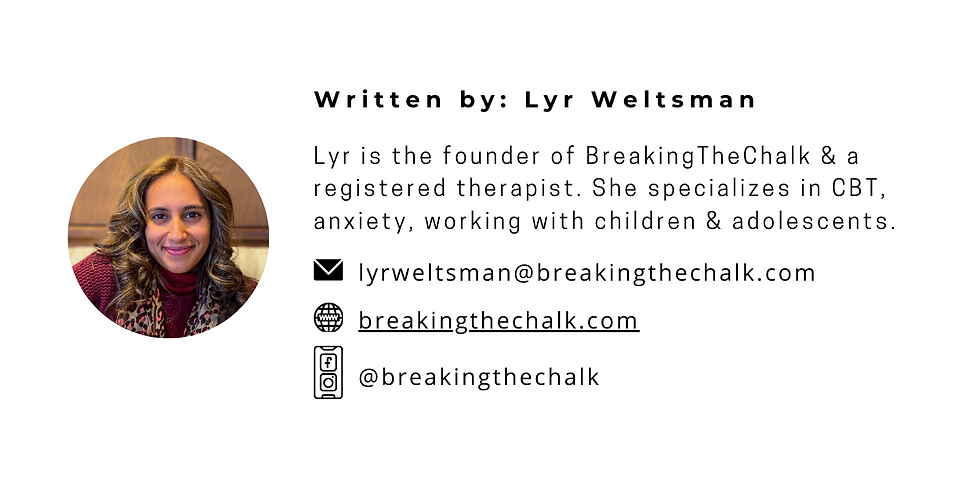Why is my teen so angry?
- Lyr Weltsman
- Jul 23, 2024
- 2 min read
Teenagers are generally going through a phase in their lives that is filled with difficulty and turmoil. They are finding their independence and identity, whilst facing lots of hormonal and physical changes, peer pressures, etc. When your teen shows anger, it is the primary emotion for a whole range of other things that are going on. So we need to look for the core of the anger - the triggers and the ‘need’ behind it.
Common Causes of Teen Anger
1. Hormonal Changes:
- Adolescence is marked by significant hormonal fluctuations that can impact mood and behaviors. These changes can lead to heightened emotions and consequently, increased irritability and anger.
2. Finding their Identity
- Teens are in the process of developing their identities, which often involves questioning authority and asserting independence. They are trying to find control during this phase. This journey can be fraught with frustration and confusion, manifesting as anger.
3. Stress and Pressure:
- Academic demands, social pressures, and future uncertainties can create a stressful environment for teens. The inability to manage these pressures effectively can result in anger outbursts.
- Friendships and social dynamics are crucial during the teenage years. Conflicts, bullying, or feeling excluded can significantly impact a teen’s emotional well-being, resulting in anger.
4. Emotional Regulation
Adolescents are still developing their emotional regulation skills and are still figuring out what they feel and need. They may struggle to express their feelings effectively, leading to anger as a default response.
6. Family Dynamics:
Changes in the family structure and relationships, such as divorce, the arrival of a new sibling, or a parent struggling with addiction, can cause emotional turmoil and confusion for teens. Additionally, strained parent-teen relationships can lead to feelings of anger, feeling misunderstood and resentment.
So, what do I do as a parent?
Listen
Actively listen and hear what your teen is trying to say, actively hear what they are sharing and see the need behind it. Don’t react, assume, or interrupt - hear them and take it seriously. Give your full attention and validate their emotions. This can help them feel understood and supported.
Open Communication
Create a safe space for your teen to express their feelings without fear of judgement or punishment.
Help them express calmly
Model how to handle anger constructively. Help your teen develop healthy coping mechanisms to manage stress and anger. Practice breathing techniques, routines, healthy habits, talking about feelings and needs.
Seek Professional help
Sometimes teens need an objective person and space to help them with their challenges. And as a parent, you may need guidance. At BreakingTheChalk, we work with you as a parent to provide guidance and understanding, whilst working with your teen to provide a safe space with practical tools for everyday life’s ups and downs.
Conclusion
Understanding the reasons behind your teen’s anger and triggers is crucial for providing the appropriate support and guidance they need. By fostering these techniques consistently and openly, you can help your teen navigate their emotions and develop healthier ways to deal with anger. Remember, your support and understanding play a vital role in your teen’s emotional development and well-being.
For teen therapy; book your first session here:



Comments